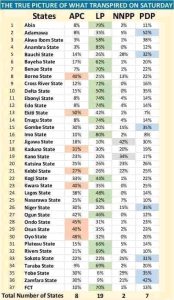Nasir El-Rufai, former governor of Kaduna State and one-time political stalwart of the All Progressives Congress (APC), has taken to social media to make startling revelations about the conduct of the 2023 presidential elections.
In a now-viral post on his official X (formerly Twitter) handle, El-Rufai shared what he described as “the true picture” of election results across Nigeria’s 36 states and the Federal Capital Territory (FCT).
The chart, which lists the percentage of votes polled by each of the four major parties, APC, Labour Party (LP), New Nigeria People’s Party (NNPP), and People’s Democratic Party (PDP), suggests that the Labour Party secured overwhelming support in 19 states, compared to APC’s 8.
Diaspora Digital Media (DDM) gathered that El-Rufai’s post included a damning message of regret and frustration over what he called his own complicity in an electoral fraud that helped install President Bola Ahmed Tinubu.

While he did not mention Tinubu by name, his words and the attached statistics strongly imply that the former Kaduna governor is now dissociating himself from the controversial outcome.
According to the data posted by El-Rufai, Labour Party secured as much as 85% of votes in Anambra State, 80% in Imo, and 79% in Abia.
The APC, in contrast, reportedly struggled to hit double digits in many of the southeastern and south-south states.
Even in some northern states like Nasarawa (62% LP) and Plateau (66% LP), the data shows LP clearly ahead of the ruling party.
The PDP dominated in seven states including Adamawa, Bauchi, Gombe, Niger, Sokoto, Yobe, and Zamfara.
NNPP, the party led by Rabiu Musa Kwankwaso, captured only two states, Jigawa and Kano, with strong numbers in those areas.
In Borno, where APC allegedly garnered 40%, LP was listed at only 25%, and NNPP at 13%.
The implication of the data shared is that, had results reflected the actual voting pattern, the Labour Party would have secured a significant electoral victory.
This post comes at a time when El-Rufai is reportedly at odds with the Tinubu administration after being sidelined in political appointments and national decision-making.
Observers have accused the former governor of double standards—first benefiting from the alleged manipulation and now turning against the system that empowered him.
“This is the same El-Rufai who actively campaigned for Tinubu and celebrated the APC’s victory at the time,” noted one analyst.
“Now that he’s been pushed to the background, he wants to expose rigging. Nigerians are watching.”
Social media users have not held back in calling out El-Rufai’s apparent hypocrisy.
One user wrote, “We all know of the mallam called El-Rufai who talks from both sides of his mouth. Now that he’s been sidelined, e don dey expose dia corruption.”
Others expressed outrage, mocking the former governor with phrases like “Yeye dey smell” and “Una father’s left nyash,” reflecting a growing public frustration with elite political infighting and dishonesty.
The post also sparked a wider conversation on the legitimacy of the 2023 general elections.
The Labour Party and its presidential candidate, Peter Obi, had long alleged widespread manipulation, particularly in the transmission of results and collation processes at various levels.
Though the judiciary dismissed most of the opposition’s legal challenges, many Nigerians remain unconvinced that the elections were free and fair.
El-Rufai’s sudden confession may not alter the current administration, but it adds weight to the growing body of evidence suggesting a coordinated effort to subvert the people’s will.
It also reflects the intense power struggle currently playing out within the ruling APC.
El-Rufai’s post appears to be a calculated move to regain political relevance by aligning himself with the popular sentiment of electoral injustice.
Analysts warn, however, that such self-serving exposés, though useful, are often tainted by the motives behind them.
“This isn’t repentance. It’s retaliation,” said a political commentator.
“If El-Rufai had been offered a ministerial slot or a presidential advisory role, we wouldn’t be seeing this tweet.”
Despite the controversy, the former governor’s data has reignited demands for electoral reform and transparency.
Civic groups are now urging the Independent National Electoral Commission (INEC) to release full polling unit results for public scrutiny.
Some citizens are also calling for a renewed investigation into the 2023 elections, demanding accountability from both INEC officials and political actors involved in the process.
The electoral map posted by El-Rufai has since gone viral, with opposition parties seizing the opportunity to reassert claims that the mandate of the Nigerian people was stolen.
Whether the post marks the beginning of more elite whistle-blowing or remains an isolated act of political vengeance, it has already added a new layer of complexity to Nigeria’s fragile democratic image.
As Nigerians brace for the 2027 elections, the lessons of 2023, now being publicly acknowledged by one of the architectsremain fresh, painful, and unresolved.







